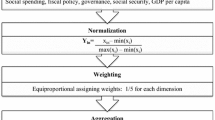Abstract
The task of comparing social policies has focused primarily on quantifying the outputs, but leaves out an important factor for policy to be carried out, as is the quantification of the inputs. This paper focuses in the government effort to financing and implementing social policies. The goal is to present the results of the implementation of Social Policy Index+ (SPI+) in the United Kingdom and Chile from 2005 to 2012, establishing a transatlantic comparison of the inputs of social policy in two countries with a liberal welfare model. The research question is: Does SPI+ allows us to establish differentiation between countries that belong to the same welfare regime at different continents? To achieve this, the study uses the SPI+ as a tool for measuring and comparing transatlantic social policies. Through a comparative analysis of SPI+ results with a contextual description it is possible to confirm the consistency of the instrument for defining subgroups within specific welfare models, that also allows measure, classify and properly compare the two countries studied.
Similar content being viewed by others
References
Ben-Arieh, A., Gal, J., Nepomnyaschy, L., & Garfinkel, I. (2007). Child and family outcomes in New York and Tel Aviv: Using social indicators in a city level comparative analysis. Social Indicators Research, 80(1), 223–248.
Castillo Rozas, G. (2014). Diseño y Aplicación de un Índice de Política Social. La utilización de la propuesta de UNRISD para comparar 3 países de la OCDE con distinto Estado de Bienestar: Chile, España y Reino Unido. Tesis Doctoral. Valencia, España: Universitat de València.
CEPAL. (2009). Balance preliminar de las economías de América Latina y el Caribe. Santiago de Chile: Naciones Unidas.
Delhey, J., Böhnke, P., Habich, R., & Zapf, W. (2002). Quality of life in a European perspective: The EUROMODULE as a new instrument for comparative welfare research. Social Indicators Research, 58(1), 161–175.
Eurostat. (2013 йил April). Government finance statistics. Retrieved 2013 from European Commission http://epp.eurostat.ec.europa.eu/portal/page/portal/government_finance_statistics/data/database
Garcés, J., & Durá, E. (1997). Ideología y política social. In C. Alemán & J. Garcés (Eds.), Política social (pp. 51–78). Madrid: McGraw-Hill.
Garcés, J., Ródenas, F., Castillo, G., & Vidal, C. (2012). The Social Policy Index: Its applicability in Latin American countries. The International Journal of Interdisciplinary Civic and Political Studies, 7(4), 27–51.
Garcés, J., Ródenas, F., Castillo, G., & Vidal, C. (2014). Comparison of social spending and tax policy before and after the crisis: The cases of Spain and Chile. The Global Studies Journal, 6, 1–18.
Garcés, J., Ródenas, F., & Vidal, C. (2015). Application of Social Policy Index (SPI) amended in three OECD countries: Finland, Spain and México. Social Indicator Research, 1–11.
Hantrais, L. (2004). Crossing cultural boundaries. In P. Kennett (Ed.), A handbook of comparative social policy (pp. 261–275). Cheltenham: Edward Elgar.
Herranz, I., Díaz, E., Montenegro, E., Machado, I., & Almeida, S. (2015). Child at risk of poverty or social exclusion: Comparative view between Spain and Portugal in the European context. Social Indicators Research, 1–18.
ISSA. (2014). Social security programs throughout the world: The Americas, 2013. Washington: ISSA.
Kaufmann, D., Kraay, A., & Mastruzzi, M. (2010). The Worlwide governance indicators: Methodology and analytical issues. New York: The World Bank.
Kennett, P., & Oakley, B. (2001). Development, social welfare and cross-national anlysis. In P. Kennett (Ed.), Comparative social policy (pp. 93–115). Buckingham: Open University Press.
Landman, T. (2011). Política comparada. Una introducción a su objeto y métodos de investigación. Madrid: Alianza Editorial.
Leibfried, S. (1991). Towards an European Welfare State? On integrating poverty regimes in the European community. Bremen: Centre for Social Policy Research.
OECD. (2013). Latin American countries: Comparative tables. Retrieved 2013 from Revenue statistics: http://stats.oecd.org/
OECD. (2016). Better Life Index. Retrieved June 2016, from http://www.oecdbetterlifeindex.org/about/better-life-initiative/
OECD Stat. (2014). OECD Stats. Recuperado el 2014, de OECD Stats: stats.oecd.org
Prasad, N. (2005). Research proposal: Construction of a Social Policy Index (SPI). Geneve: UNRISD.
UK Polling Report. (2014). UK Polling Report. Recuperado el 2014, de UKPollingReport: http://ukpollingreport.co.uk
Ródenas, F., Garcés, J., Vidal, C., & Castillo, G. (2013). Social spending and taxes in Spain: The effects of the current crisis in a country with a Southern Welfare. In Eighth international conference on interdisciplinary social sciences (pp. 1–11). Prague, Czech Republic: CGPublisher.
Schuschny, A., & Soto, H. (2009). Guía metodológica: Diseño de indicadores compuestos de desarrollo sostenible. Santiago de Chile: Naciones Unidas.
Stern, S., Wares, A., & Orzell, S. (2015). Social Progress Index 2015. Methodological Report. Washington: Social Progress Imperative.
The Economist Intelligence Unit. (2015). The 2015 Quality of Death Index. Ranking palliative care across the world. The Economist: London.
Author information
Authors and Affiliations
Corresponding author
Rights and permissions
About this article
Cite this article
Ródenas Rigla, F., Castillo Rozas, G., Vidal Figueroa, C. et al. SPI+ Application in Two Countries with the Liberal Welfare Model: Cases of United Kingdom and Chile. Soc Indic Res 134, 253–261 (2017). https://doi.org/10.1007/s11205-016-1420-4
Accepted:
Published:
Issue Date:
DOI: https://doi.org/10.1007/s11205-016-1420-4




